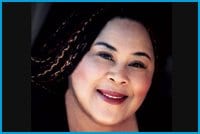No need to check the forecast for Pride Weekend this year, ’cause Weather Girl Martha Wash will be thundering out the hits for her bevy of homo and straight fans alike.
Wash is a big headliner for this year’s music program, and the beloved diva is tickled pink to add our festivities to a long string of Pride performances this summer.
“June is completely booked,” she marvels. “Everybody wants a tune, but you can’t be everywhere.”
Lucky for us, Toronto managed to lure the big-voiced lady north to blast out classics from her 30-plus-year career. From “It’s Raining Men,” her first hit with fellow Weather Girl Izora Rhodes, and the groundbreaking “Everybody Dance Now” with C+C Music Factory, to her hit “Carry On” and the Outgames anthem “You Lift Me Up,” Wash has effectively raised three generations of clubgoers.
“It’s funny,” says Wash, “the fan mail that I get now is from a lot of kids and… teen-agers. They say [their] parents listened to me, so now they all like the music. It’s been amazing to me.”
When asked what she feels is the unifying component of her music, Wash ventures that it may be a combination of the approachable melodies and positive message. “For the most part, I like to pick songs that uplift a person,” she says, “something that gives them a boost and keeps them going from Monday to Sunday.”
She’s flattered, if a little dumbfounded, at her tremendous gay following. “I don’t know why they love me,” she says. “I think it has to do with being associated with the gay community and doing the music and the clubs for so many years.”
Those club years are a far cry from Wash’s start as an operatically trained gospel singer, belting out hymns in her childhood San Francisco church. A backup gig with disco band Sylvester quickly led to duo work with the late Rhodes. Initially dubbed Two Tons Of Fun, the gals went on to roaring success as The Weather Girls, before going their separate ways in the late 1980s.
It was a throwaway vocal demo for another artist that led to Wash’s second wave of fame in 1990, when the producers decided to release her tracks under the name C+C Music Factory. It came just as the house music movement was hitting its stride, and the hits “Everybody Everybody,” “Strike It Up” and “Gonna Make You Sweat” roared up the charts.
Unfortunately, the producers hadn’t bothered to ask Wash’s permission to use her voice on the recording, and didn’t credit her on the album. Adding insult to injury, they opted to have a skinny scrap of a girl lip-synch to Wash’s vocals for the videos and live performances.
What followed was a perfect storm of successful court challenges, culminating in an appearance before the US Congress which ensured that vocalists would henceforth receive proper credit for their work.
Wash has since made peace (and a whole whack of dough) with the situation, and has continued touring and recording for her own Purple Rose Records label, as well as a notable turn on Jim Papoulis’s album Sounds For A Better World.
Despite decades of success and adulation, Wash seems unaware of her impact on popular music. She balks good-naturedly when the label of music icon is lobbed her way.
“I just call myself a working woman,” she laughs. “I’m workin’ on my job.”

 Why you can trust Xtra
Why you can trust Xtra


